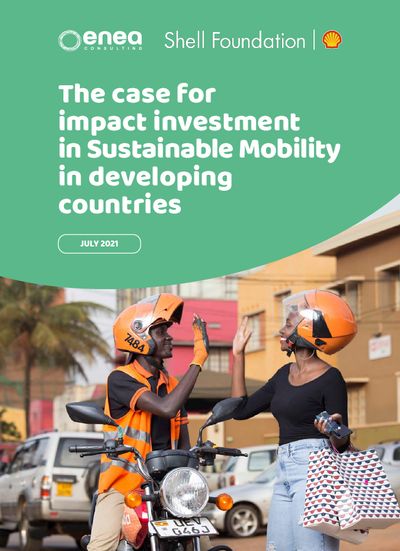The case for impact investment in Sustainable Mobility in developing countries

The Shell Foundation commissioned Blunomy (Enea Consulting) to study the sector and derive a case for Sustainable Mobility investment in developing countries. In commissioning this study, the Shell Foundation expects to increase awareness and help remove barriers to investment in Sustainable Mobility.
Combining the results of an investor survey with an impact materiality analysis of the whole sector and several case studies, this report presents the case for impact investment in Sustainable Mobility. It is divided into three parts: Part 1, on Sustainable Mobility and how it presents a significant investment opportunity with a proven funding gap; Part 2, on the different impact types the sector presents, with a focus on the UN SDGs; and Part 3, on seizing the investment opportunities presented and how the range of solutions and potential impacts make for a compelling opportunity for a range of investor types.
Sustainable Mobility has gained traction over the past years, but large amounts of investment are required for the sector to develop further. Investors have frequently overlooked the sector due to various barriers, notably a lack of knowledge on the sector, its wide range of solutions and their significant impact on society.
Going beyond known transport infrastructure projects, Sustainable Mobility ventures involve entrepreneur-led B2C solutions in both rural and urban settings, targeting low-income populations and remedying key challenges of mobility in developing countries. They seek to alleviate multiple mobility challenges in emerging markets, including; accessibility, through improving geographical access, and inclusion of low-income populations through affordable mobility and gender inclusion; health and safety, through reducing accidents and improving security for passengers; efficiency, through reducing time in transit and traffic congestion and improving the reliability of mobility solutions; and climate change and the environment, through reducing GHG emissions and pollution.
Entrepreneur-led Sustainable Mobility services and solutions require significant capital as many rely on new assets or infrastructure, involve technical innovation, and are subject to political and financial risks which render it difficult to raise funds. Notwithstanding this, Sustainable Mobility has the potential to generate extensive impact on customers of the mobility solution, employees, and the community the venture serves. Regardless of the investor type or focus, there is substantial opportunity to generate impact, especially with respect to:
- Improving health through reduced pollution and safety through reduced accidents
- Enhancing socio-economic development and inclusion for mobility customers, employees and the broader community
- Reducing carbon and environmental footprint from transportation
- Fostering gender inclusion
As a sector gaining traction, Sustainable Mobility requires continued and increased investment from the full spectrum of investor classes if enterprise solutions are to be seeded and scaled effectively in developing countries. However, it requires a concerted effort by investors to tackle current hurdles to funding. Despite its challenges, Sustainable Mobility is a unique and emerging sector within which solutions are critical, and for which significant impact investment opportunities exist that can meet different investment mandates.